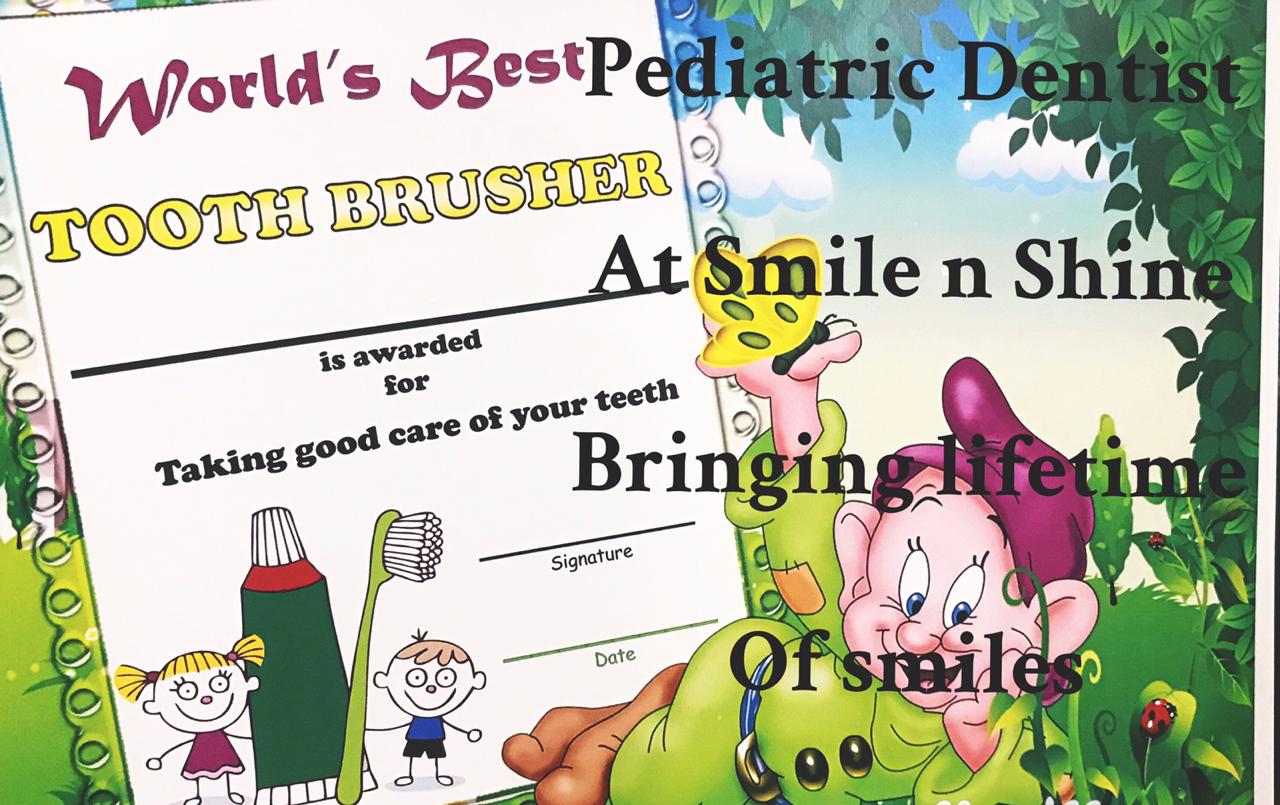Treatment Spectrum
|
Child DentistryPedodontics or pediatric dentistry is a dedicated branch of dental science for the treatment of children. Pedodontics or paediatric dentistry is known as one of the most challenging branches of dentistry as it involves taking care of low age patients who even do not know what is best for them. For the same reason, we at smile ‘n’ shine take proper care of your children as well as provide best dental care by a team of trained and highly educated pedodontists. Generally, pediatric dentistry deals with the problems of under the age of 12-year-old. It worth mention pediatric dentists need two or three extra years for dental training to get expertise in meeting the unique dental needs of infant, children and adolescent dental care. This course also includes special health care needs. Differentiating itself from general dentistry, pediatric dentistry focuses on the establishment of trust and confidence in children with dentist. As a matter of fact, one of the main points of pediatric training is child psychology. This marks emphasis on teaching preventative dental habits to children to make visit to dentist an enjoyable experience. For children, pedodontics assert s on preventing tooth decay. Studies and researches prove that poor oral health care regime in children lead to decreased school performance and pitiable social relationships. So, medicos give tips to make and keep teeth strong. Their recommendations prove very useful to prevent cavities. In addition, child specialists work for the maintenance of primary teeth (baby teeth) until they are naturally lost. This is due to the attention they serve in permitting children to chew properly and therefore maintaining good nutrition. Its role in speech development and the way it helps permanent teeth by saving space for them. Preventative oral health is emphasized and necessary information is provided to adolescents about sealants Dental experts do only not aid in oral health of children but also serve as a teacher for parents. It is advised that several dental visits should be performed between the presence of first tooth in child to first birthday. It is necessary because early mouth examinations helps in the detection of early stages of tooth decay and can therefore instantly be treated. Furthermore, parents and guardians are instructed for a specialized program for proper use of brushing, flossing and fluorides. Dental Care for Young Children: Summary of Best Practice RecommendationsWhen should parents begin to clean their baby’s teeth: “Early you start, better it proves” The [American Academy of Pediatric Dentistry prefers that parents or caretakers should begin dental cleaning at birth by cleaning child’s gums with a soft toothbrush and water. Do not use fluoridated toothpaste until child reaches the 2-3 years of age. When should children first visit a dentist?"After one year" According to the [American Academy of Pediatric Dentistry;] children should pay the visit to dentist when they receive first tooth or by first birthday. Early dental care is important for protection against several oral diseases. Early childhood dental sufferings are known as baby bottle tooth decay or nursing caries. How can I prevent tooth decay from a bottle or nursing? To prevent decaying in children, [American Academy of Pediatric Dentistry recommends children to be encouraged to begin drinking from cup or glass as they celebrate first birthday. Children should not go to bed with bottle in mouth. It is advised that nighttime breast-feeding should be avoided after first (baby) teeth begin to erupt. Taking juice or other kinds of drinks from bottle should always be avoided. These drinks must be offered in cup, glass or bowl. Infant Oral Health Even babies can have problems with dental decay when parents do not exercise good feeding habits. Proper care for teeth begins even before baby's first tooth comes. Always remember that just because you cannot see does not mean teeth are not there. They actually begin to form in the second trimester of pregnancy. At birth every baby has at least 20 primary teeth, some of them are entirely developed in the jaw.
Moving a damp cloth over baby's gums following feeding can keep damaging bacteria away. Once child has a few teeth showing, you can clean them with a soft toothbrush or rub with gauze at the end of the day. Do not put baby to sleep with bottle in mouth as it may be convenient in short term but can prove very harmful for its teeth. When sugar from juice or milk remains on teeth for hours, they may drain the enamel, creating a condition known as bottle mouth. Pocked, pitted, or discolored front teeth are the basic signs of bottle mouth. Severe cases result in cavities and require pulling all teeth of front line until permanent grow in. Parents, guardians and care takers should also help young children develop set times for drinking during the day as well because sucking on a bottle throughout the day can be equally damaging to young teeth. Child's first visit to the dentist should take place by first birthday. During the visit, dentist will instruct proper brushing and flossing techniques (you need to floss once baby has two teeth that touch) and conduct a modified exam. Such visits prove extremely helpful to detect problems in early stage. In addition, child becomes accustomed to visit doctor which means he or she will has less fear while visiting doctor. When child’s all primary teeth have appeared, dentist will start applying topical fluoride during child's visits. Fluoride hardens the enamel on tooth, helping to ward off the most common childhood oral disease, dental caries or cavities. Bacteria or food that is left over teeth after eating causes cavities. When these are not cleaned, acid collects on tooth to cause severe damage by softening the enamel. Consistent use of fluoride toughens the enamel, making it very difficult for acid to penetrate. If water supply is not fluoridated or your family uses purified water, ask the trained and experienced dentist for fluoride supplements. However most of the toothpastes contain fluoride, toothpaste alone will not entirely protect child's teeth. Be careful while using fluoride as it might also cause tooth discoloration. Ask your dentists to fetch optimum results. Discoloration can also be occurred due to persistent use of antibiotics as children's medications mainly contain a large amount of sugar. Parents must encourage children for brushing after taking medicines, especially if prescription will be long-term. Brush teeth at least twice a day and routine flossing will help to maintain oral health. Children as young as 2-3 years of age can begin using toothpaste when brushing as long as they are supervised. Children must not use large amount of toothpaste - a pea-sized amount for toddlers is perfect. Parents and guardians must always make sure that child spits toothpaste out, instead of ingesting. As child's permanent teeth come in, dentist can help seal out decay or cavity by applying a thin wash of resin to back teeth, where most of the chewing happens. Known as a sealant, this protective coating keeps bacteria and germs away from settling in hard-to-reach crevices of molars. Although dental researches have resulted in increasingly sophisticated preventative technologies, including fillings and sealants that seep fluoride, a dentist's advice is the only part of the equation. Follow-up at home plays an equally key role. For example, sealants on child's teeth do not mean that he or she can eat sweets uncontrollably or give a miss to daily brushing – parents and elders must work with children to teach good oral health habits. If you are prone to decay or other oral problems your child may also be at higher risk. For the same reason, sometimes even the most diligent brushing and flossing will not prevent cavities. Do not delay to call dentist if child complaints about pain in mouth. It could be a sign of a cavity that needs to be treated on immediate basis. New innovations have given dentists more filling and repairing options than ever before. Silver remains the substance of choice for majority of fillings in permanent teeth. Other materials such as composite resins also are gaining popularity. Composite resins bond to teeth so that filling won't pop out, and they can be used to rebuild teeth damaged through injury or conditions such as cleft palate. Tooth-colored resins prove more attractive. But in cases of fracture, extensive decay, or malformation of baby teeth, dentists often opt for stainless steel crowns. Crowns maintain tooth while regulating decay. As child grows older, you may be concerned about his or her bite and the straightness of teeth. Orthodontic treatment begins earlier now than it once did. What once was a symbol of preteen anguish - a mouth filled with metal wires and braces - has become history. Kids as young as age of 7 are now sporting corrective appliances. Efficient and promising, plastic-based materials have replaced old-fashioned metal contraptions. Dentists now understand that manipulation of teeth at a younger age can be easier and more effective in the long term. Teeth of younger children can be modified with relatively minor orthodontia, thus preventing major orthodontia later on. Thus, it is quite clear that plan routine dental check-ups as children grow. Limit consumptions of sugary eatables and drinks as well as brush and floss regularly to contribute to child's dental health. Your ideal partnership with child's dentist will help keep child's teeth healthy and rock strong. In addition, it will provide confidence to smile without hesitation. |





